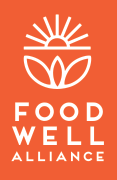Atlanta is home to many beautiful urban farms and community gardens that provide nutrient-rich, sustainably-grown food for our growing communities. But key to their success and long-term sustainability is healthy soil.
In 2016, Food Well Alliance surveyed community gardens and urban farms and learned learned through a community garden survey that there is a lack of access to high-quality compost for community gardens and urban farms in Metro Atlanta.
The survey also showed that 40% of community gardens struggle with poor soil health, which results in increased pests and plant disease.
After listening to community gardeners and urban farmers who shared their need for healthy soil, Food Well Alliance is working to increase the supply of community-based compost in Metro Atlanta. By doing this, it will not only improve soil health, but will promote more local, sustainably-grown food in communities.
Community-Based Composting in Atlanta
Community-based composting is engaging community members to process organic material on a scale that is typically smaller than full-scale composting. Community-based composting operations that currently exist in Metro Atlanta are often located at community gardens and urban farms, or may be stand-alone operations on vacant lots within communities.
Many of those operations engage area residents and small-scale businesses to source separate food scraps for composting at the community site, which:
- Accepts feedstock, e.g., food scraps from off-site
- Seeks to keep organic materials in a closed loop from the source of feedstock
- Are typically limited by state regulations to processing a specific amount of material which is measured by the amount of allowed on-site at any one time or by square footage of the composting area.
Community-Based Composting Working Table
In 2017, Food Well Alliance convened a Community-Based Composting Working Table, bringing together compost experts, entrepreneurs, educators and advocates to team up on how to systematically advance community-based composting for Atlanta’s community gardeners and farmers.
Food Well Alliance held four structured, facilitated convening sessions for the Community-Based Composting Working Table, spanning there months with 15 private, public and not-for-profit stakeholders with more than 15 years of combined composting experience.
The Working Table developed a set of recommendations to scale and support community-based composting in Metro Atlanta. To learn more about the Community-Based Composting Working Table, visit here.
Closing the Loop: Food Waste in Atlanta
In 2017, we brought together a diverse group of public, private, and nonprofit leaders for the Community-based Composting Working Table who identified 78 challenges, 62 opportunities, and reached consensus on 9 strategic recommendations to increase community-based composting in Metro Atlanta.
We have now shared these findings through a white paper entitled Closing the Loop, Food Waste in Atlanta: Strategies to Increase Sustainable Compost Production for Metro Atlanta’s Urban Farms and Community Gardens.
Compost White Paper key findings include:
Locally Produced Compost Demand is Strong and Growing
Georgia’s Compost Industry Needs the Right Regulatory Climate
Feedstock Contamination is a Safety Issue and an Economic Issue
The Social Enterprise Model is an Attractive Solution to Increase Community-based Composting
Compost Design Table
Design Tables work as a process accelerator that focus on designing innovative pilot projects that can be tested, leading to viable and scalable solutions that can be replicated across Metro Atlanta.
Compost Design Table Fellows are unique in their ability to leverage their organizational assets and intellectual capital to work collaboratively with their team to develop solutions for increasing community-based composting.
The Compost Design Table will last for a maximum of 10 months. Upon completion of the Design Table’s design phase, Fellows will pitch the proposed pilot plan to Food Well Alliance. Research and funding to support the pilot will be provided by Food Well Alliance.
Atlanta Community-Based Composting Council
With generous support from the U.S. Environmental Protection Agency, Food Well Alliance is working closely with the Georgia Recycling Coalition to convene the Atlanta Community-Based Composting Council to increase community-based compost production to benefit Metro Atlanta’s urban farmers and community gardeners. The council held its initial kick-off convening in August 2017.



